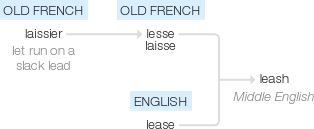Leash
Middle English: from Old French lesse, laisse, from laissier in the specific sense ‘let run on a slack lead’ (see lease).
wiktionary
From Middle English leesshe, leysche, lesshe, a variant of more original lease, from Middle English lees, leese, leece, lese, from Old French lesse (modern French laisse), from Latin laxa(“thong, a loose cord”), feminine form of laxus(“loose”); compare lax. Doublet of laisse.
etymonline
leash (n.)
c. 1300, "thong for holding a dog or hound," from Old French lesse, laisse "hound's leash," ultimately from Latin laxus "loose" (see lax), perhaps via noun use of fem. form laxa. The notion seems to be of a string loosely held. Figurative sense attested from early 15c. The meaning "a set of three, three creatures of a kind" is from early 14c., originally in sporting language and especially of greyhounds, foxes, bucks, or hares.
leash (v.)
"to attach to or with a leash," 1590s, from leash (n.). Related: Leashed; leashing.
